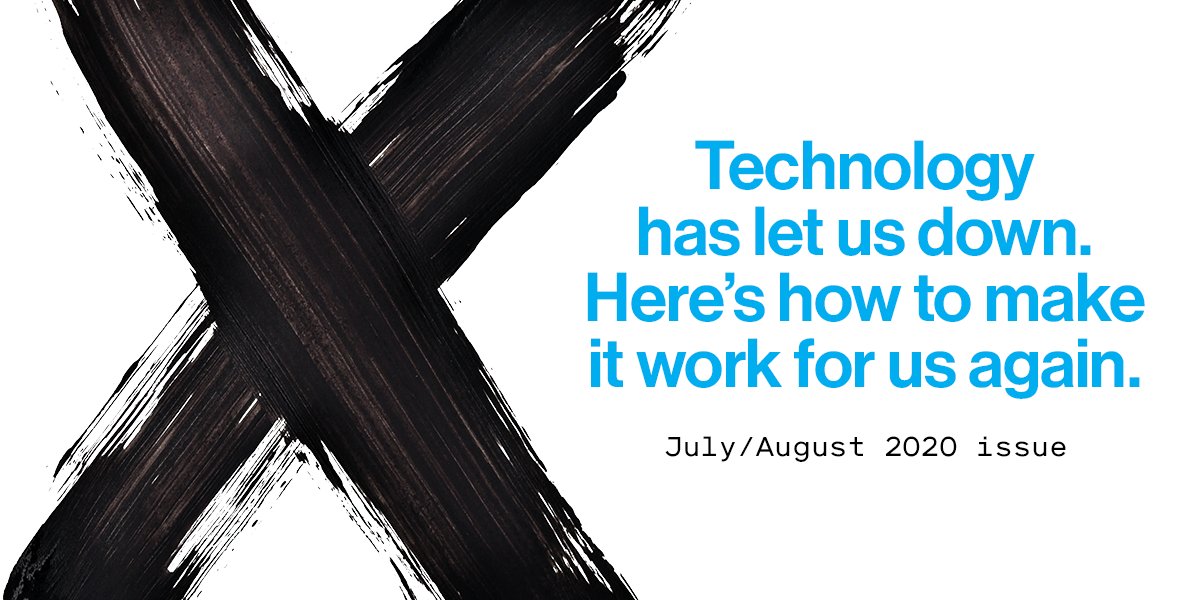Two entrepreneurs share a goal: to help people overcome opioid addiction. #Echobox=1592413092">https://www.technologyreview.com/2020/06/17/1003310/a-tale-of-two-startups/?utm_medium=tr_social&utm_campaign=site_visitor.unpaid.engagement&utm_source=Twitter #Echobox=1592413092">https://www.technologyreview.com/2020/06/1...
One, @ZarkGray, has an Ivy League education and $2.7 million in venture capital funding. The other, Nikki King, went to the @universityofky and has a fraction of that amount, cobbled together from grants, donations, and Medicaid reimbursements.
That means the only people he can help are people who can pay. This is the inexorable logic of venture capital, as @editoremacb writes. #Echobox=1592412673">https://www.technologyreview.com/2020/06/17/1003318/why-venture-capital-doesnt-build-the-things-we-really-need/?utm_medium=tr_social&utm_campaign=site_visitor.unpaid.engagement&utm_source=Twitter #Echobox=1592412673">https://www.technologyreview.com/2020/06/1...
(3/3) It funnels money from people who have it (customers) to people who have even more of it (investors). Those who have none of it have no say in one of the main driving forces of American innovation. #Echobox=1592412673">https://www.technologyreview.com/2020/06/17/1003318/why-venture-capital-doesnt-build-the-things-we-really-need/?utm_medium=tr_social&utm_campaign=site_visitor.unpaid.engagement&utm_source=Twitter #Echobox=1592412673">https://www.technologyreview.com/2020/06/1...
The tech we have mirrors the society we have, and specifically the way power in that society is distributed.
Those who have power, be it through money, connections, or other kinds of privilege, have much more say in deciding which technologies get built and whom they benefit.
Those who have power, be it through money, connections, or other kinds of privilege, have much more say in deciding which technologies get built and whom they benefit.
Such a system f a i l s many people.
Covid-19 and, more recently, the protests in the US sparked by the police officer who calmly murdered the unarmed, unresisting George Floyd in full view of cameras have made this clearer than ever.
(1/4) The venture-capital-driven tech boom of recent decades has not given the country much of the technology and infrastructure it needs to fight a pandemic.
(2/4) It has worsened economic inequality, political polarization, and the spread of misinformation.
(3/4) It has not reduced racial injustice: even though police brutality against black people has been documented countless times on cell phones and police bodycams in the past few years, the death toll has stayed perfectly steady.
(4/4) Indeed, the US has used technology to make racial oppression more systematic, as @cmcilwain writes. #Echobox=1591994150">https://www.technologyreview.com/2020/06/03/1002589/technology-perpetuates-racism-by-design-simulmatics-charlton-mcilwain/?utm_medium=tr_social&utm_campaign=site_visitor.unpaid.engagement&utm_source=Twitter #Echobox=1591994150">https://www.technologyreview.com/2020/06/0...
The pandemic e x a c e r b a t e s these inequities.
Not only are people in some of the lowest-paid, most precarious jobs at highest risk of catching covid-19, but as @ErikaHayasaki explains, the crisis is likely to accelerate their replacement with robots and other forms of automation. #Echobox=1592412759">https://www.technologyreview.com/2020/06/17/1003328/covid-19-could-accelerate-the-robot-takeover-of-human-jobs/?utm_medium=tr_social&utm_campaign=site_visitor.unpaid.engagement&utm_source=Twitter #Echobox=1592412759">https://www.technologyreview.com/2020/06/1...
None of this is the fault of technology, but of a society that gives markets, and therefore the rich and powerful, too much say over which technologies are built and how they are used.
(1/2) This is not a call for socialism: free markets are essential to innovation. But America’s technology prowess owes much to government funding and direction, both of which have declined over the decades, as @DavidRotman explains. #Echobox=1592412844">https://www.technologyreview.com/2020/06/17/1003312/why-tech-didnt-save-us-from-covid-19/?utm_medium=tr_social&utm_campaign=site_visitor.unpaid.engagement&utm_source=Twitter #Echobox=1592412844">https://www.technologyreview.com/2020/06/1...
As does @IlanGur: #Echobox=1592412889">https://www.technologyreview.com/2020/06/17/1003322/how-the-us-lost-its-way-on-innovation/?utm_medium=tr_social&utm_campaign=site_visitor.unpaid.engagement&utm_source=Twitter #Echobox=1592412889">https://www.technologyreview.com/2020/06/1...
More muscular policy and regulation could also help with the post-covid recovery, writes @ntnsndr, by creating incentives and support for local entrepreneurs to build technological solutions for their own communities. #Echobox=1592412968">https://www.technologyreview.com/2020/06/17/1003316/what-the-1930s-can-teach-us-about-dealing-with-big-tech-today/?utm_medium=tr_social&utm_campaign=site_visitor.unpaid.engagement&utm_source=Twitter #Echobox=1592412968">https://www.technologyreview.com/2020/06/1...
It’s hard to see much appetite for this kind of policymaking in the current US government.  https://abs.twimg.com/emoji/v2/... draggable="false" alt="👇" title="Rückhand Zeigefinger nach unten" aria-label="Emoji: Rückhand Zeigefinger nach unten"> #Echobox=1592412968">https://www.technologyreview.com/2020/06/17/1003316/what-the-1930s-can-teach-us-about-dealing-with-big-tech-today/?utm_medium=tr_social&utm_campaign=site_visitor.unpaid.engagement&utm_source=Twitter #Echobox=1592412968">https://www.technologyreview.com/2020/06/1...
https://abs.twimg.com/emoji/v2/... draggable="false" alt="👇" title="Rückhand Zeigefinger nach unten" aria-label="Emoji: Rückhand Zeigefinger nach unten"> #Echobox=1592412968">https://www.technologyreview.com/2020/06/17/1003316/what-the-1930s-can-teach-us-about-dealing-with-big-tech-today/?utm_medium=tr_social&utm_campaign=site_visitor.unpaid.engagement&utm_source=Twitter #Echobox=1592412968">https://www.technologyreview.com/2020/06/1...
For signs of hope, one might look to Canada, where the tech hub of Toronto is trying (or so its boosters say, at any rate) to be a sort of gentler, kinder Silicon Valley, driven more by a concern for technology’s social consequences, writes @BrianJBarth. #Echobox=1592412990">https://www.technologyreview.com/2020/06/17/1003314/toronto-would-like-to-be-seen-as-the-nice-persons-silicon-valley-if-thats-not-too-much-trouble/?utm_medium=tr_social&utm_campaign=site_visitor.unpaid.engagement&utm_source=Twitter #Echobox=1592412990">https://www.technologyreview.com/2020/06/1...
Look, too, at individual scientists, inventors, and entrepreneurs with ambitious, idealistic goals. As we do every year, we’ve assembled a global and—importantly—diverse group of leading young innovators. #Echobox=1592413014">https://www.technologyreview.com/innovators-under-35/2020/?utm_medium=tr_social&utm_campaign=site_visitor.unpaid.engagement&utm_source=Twitter #Echobox=1592413014">https://www.technologyreview.com/innovator...
We’ve also interviewed some of the past years’ winners about what they’ve learned along their journeys. #Echobox=1592413051">https://www.technologyreview.com/2020/06/17/1003324/six-tales-from-the-trenches-of-running-a-startup/?utm_medium=tr_social&utm_campaign=site_visitor.unpaid.engagement&utm_source=Twitter #Echobox=1592413051">https://www.technologyreview.com/2020/06/1...
Their examples, we hope, can serve to inspire funders, policymakers, and other technologists with a reminder of the good technology can do when it is directed at helping everyone—not just the moneyed and powerful. #Echobox=1592413051">https://www.technologyreview.com/2020/06/17/1003324/six-tales-from-the-trenches-of-running-a-startup/?utm_medium=tr_social&utm_campaign=site_visitor.unpaid.engagement&utm_source=Twitter #Echobox=1592413051">https://www.technologyreview.com/2020/06/1...
The content in this thread was originally written by @glichfield for his editor& #39;s letter for our July/August 2020 special issue on innovation. You can read that here: #Echobox=1592416887">https://www.technologyreview.com/2020/06/17/1003310/a-tale-of-two-startups/?utm_medium=tr_social&utm_campaign=site_visitor.unpaid.engagement&utm_source=Twitter #Echobox=1592416887">https://www.technologyreview.com/2020/06/1...
That special issue on innovation is out today! Read the rest of the magazine here: #Echobox=1592416944">https://www.technologyreview.com/magazines/the-innovation-issue/?utm_medium=tr_social&utm_campaign=site_visitor.unpaid.engagement&utm_source=Twitter #Echobox=1592416944">https://www.technologyreview.com/magazines...
And don& #39;t forget to sign up for our Download newsletter. Five mornings a week, we round up the most important stories in emerging technology. #Echobox=1592417065">https://forms.technologyreview.com/the-download/?utm_medium=tr_social&utm_campaign=site_visitor.unpaid.engagement&utm_source=Twitter #Echobox=1592417065">https://forms.technologyreview.com/the-downl...

 Read on Twitter
Read on Twitter






